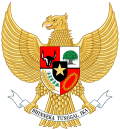Development Reform Cabinet Kabinet Reformasi Pembangunan | |
|---|---|
| 35th Cabinet of Indonesia | |
| 1998–1999 | |
 | |
| Date formed | 23 May 1998 |
| Date dissolved | 20 October 1999 |
| People and organisations | |
| Head of government | B. J. Habibie |
| No. of ministers | 36 ministers |
| Member parties | |
| Status in legislature | Supermajority coalition 500 / 500 |
| History | |
| Predecessor | Development VII Cabinet |
| Successor | National Unity Cabinet |
| This article is part of a series on the |
| Politics of Indonesia |
|---|
 |
The Development Reform Cabinet (Indonesian : Kabinet Reformasi Pembangunan) was the Indonesian cabinet which served under President B. J. Habibie during his term as president from 23 May 1998 to 20 October 1999.
Contents
- President
- Coordinating ministers
- Departmental ministers
- State ministers
- Official with ministerial rank
- Changes
- See also
- References
- Notes
Despite having the word "Reform" as part of its name, the Development Reform Cabinet consisted mostly of the names which had served in Suharto's Seventh Development Cabinet. There were however some reformist actions taken with the line up of this cabinet. The governor of the central bank and the attorney general were originally left out of the cabinet as part of Habibie's desire to make the two positions independent of executive control. [1] Habibie was successful in giving the governor of the central bank independent authority, although he would continue to retain control of the attorney general. Another reformist step taken was the inclusion of United Development Party member and future chairman Hamzah Haz instead of keeping the cabinet exclusive to Golkar and members of the Indonesian National Armed Forces.
